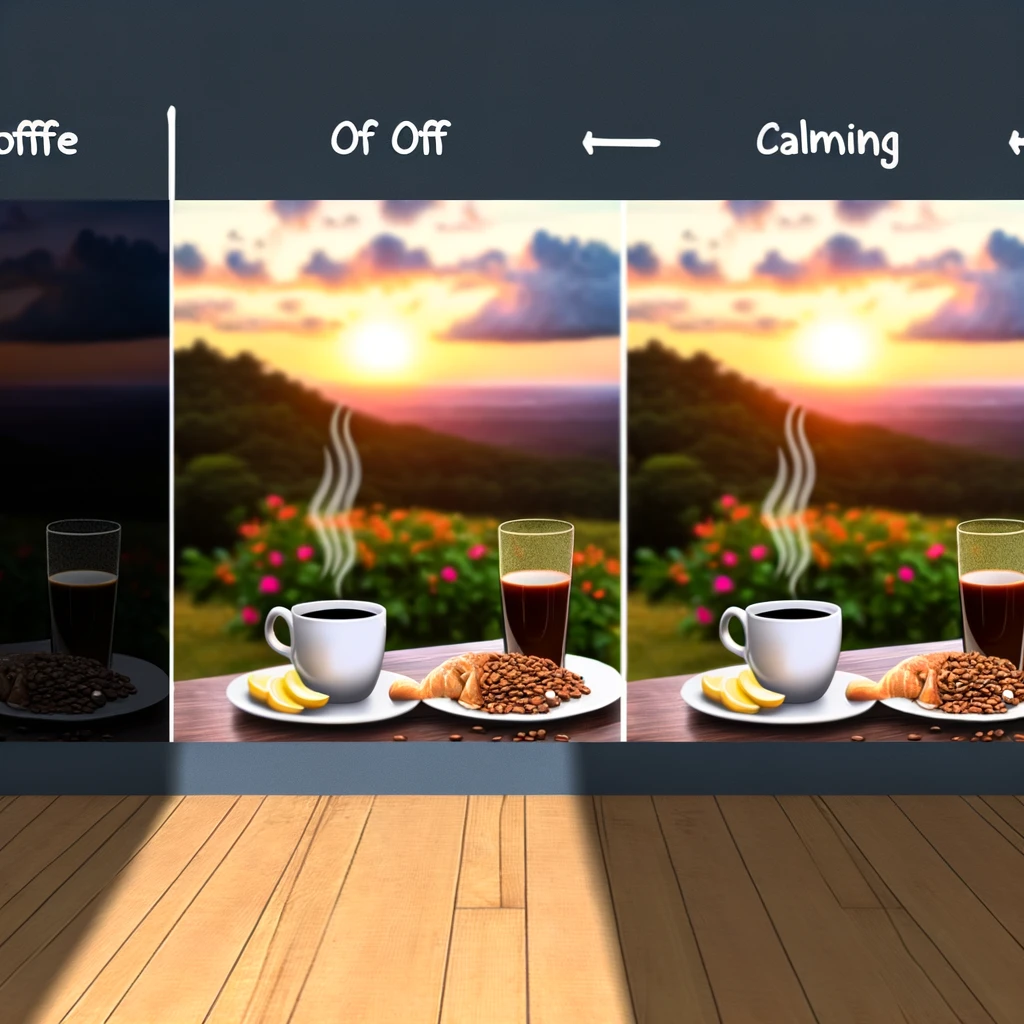
Blog
-
Table of Contents
- Understanding Caffeine Metabolism: How Long Does It Take?
- Factors Influencing Caffeine Duration in Your System
- Caffeine Half-Life: What You Need to Know
- Comparing Caffeine Effects: Coffee vs. Energy Drinks
- How Age and Genetics Affect Caffeine Clearance
- The Role of Sleep in Caffeine Metabolism
- Caffeine Sensitivity: Why It Varies Among Individuals
- Tips to Reduce Caffeine’s Impact on Your Sleep
- How Diet and Hydration Influence Caffeine Duration
- Caffeine Withdrawal: Symptoms and Timeline
- Q&A
Caffeine, a central nervous system stimulant found in coffee, tea, and various energy drinks, typically has a half-life of about 3 to 5 hours in the average adult. This means that it takes approximately 3 to 5 hours for the body to eliminate half of the caffeine consumed. However, the total time for caffeine to completely wear off can vary significantly depending on individual factors such as age, liver function, pregnancy, medication use, and genetic differences. On average, it can take anywhere from 8 to 14 hours for caffeine to be fully metabolized and excreted from the body.
Understanding Caffeine Metabolism: How Long Does It Take?
Understanding caffeine metabolism is a fascinating journey into the intricate workings of the human body. Caffeine, the world’s most widely consumed psychoactive substance, is a staple in many people’s daily routines. Whether it’s the morning cup of coffee, an afternoon tea, or an energy drink to power through a late-night study session, caffeine is often the go-to solution for a quick energy boost. However, understanding how long it takes for caffeine to wear off can help us make more informed choices about our consumption and its impact on our lives.
When you sip that steaming cup of coffee, caffeine quickly enters your bloodstream and begins its stimulating dance with your central nervous system. Within 15 minutes, you might start to feel more alert and focused. This is because caffeine blocks adenosine, a neurotransmitter that promotes relaxation and sleepiness. As a result, the levels of other neurotransmitters like dopamine and norepinephrine increase, enhancing your mood and cognitive functions.
However, the initial buzz is just the beginning of caffeine’s journey through your body. The half-life of caffeine, which is the time it takes for the concentration of caffeine in your blood to reduce by half, typically ranges from three to five hours. This means that if you consume 200 milligrams of caffeine, after about five hours, you would still have approximately 100 milligrams in your system. Factors such as age, liver function, pregnancy, and even genetic makeup can influence this duration, making it a unique experience for each individual.
As the hours pass, the stimulating effects of caffeine gradually diminish. You might notice a gentle decline in your energy levels, but the substance is still present in your system. For some, this lingering presence can interfere with sleep if consumed too late in the day. It’s not uncommon for people to experience difficulty falling asleep or staying asleep after an evening coffee. This is why understanding your body’s response to caffeine and timing your intake accordingly is crucial for maintaining a healthy sleep cycle.
Moreover, the way caffeine is metabolized can also be influenced by lifestyle choices. For instance, smokers tend to metabolize caffeine faster than non-smokers, while certain medications can either speed up or slow down the process. Additionally, habitual caffeine consumers might develop a tolerance, requiring higher doses to achieve the same stimulating effects. This can lead to a cycle of increased consumption and potential dependency, making it even more important to be mindful of your intake.
In the grand tapestry of our daily lives, caffeine can be both a helpful ally and a potential disruptor. By paying attention to how our bodies metabolize this powerful stimulant, we can harness its benefits while minimizing its drawbacks. It’s about finding that delicate balance, understanding that while caffeine can provide a much-needed boost, it also requires time to wear off and allow our bodies to return to their natural state of rest.
Ultimately, the key lies in self-awareness and moderation. By tuning into our body’s signals and respecting its rhythms, we can enjoy the perks of caffeine without compromising our well-being. So, the next time you reach for that cup of coffee, take a moment to consider not just the immediate lift it provides, but also the journey it will embark upon within you. In doing so, you can make choices that support both your productivity and your overall health, creating a harmonious relationship with this remarkable substance.
Factors Influencing Caffeine Duration in Your System
Caffeine, the beloved stimulant found in coffee, tea, and various energy drinks, is a daily ritual for many. It provides that much-needed jolt to kickstart the day or keep us going during long hours. However, understanding how long caffeine stays in your system can be crucial for managing its effects on your body and mind. Several factors influence the duration of caffeine’s presence in your system, and by exploring these, you can better tailor your caffeine consumption to suit your lifestyle.
Firstly, the concept of caffeine half-life is essential. The half-life of caffeine, which is the time it takes for the concentration of caffeine in your blood to reduce by half, typically ranges from three to five hours. However, this can vary significantly based on individual differences. For instance, your genetic makeup plays a pivotal role. Some people possess genetic variations that make them metabolize caffeine faster, while others process it more slowly. This genetic predisposition can mean the difference between feeling jittery after a single cup of coffee or being able to enjoy multiple cups without adverse effects.
Moreover, age is another critical factor. As we age, our metabolism tends to slow down, and this includes the metabolism of caffeine. Younger individuals often process caffeine more quickly, while older adults may find that caffeine lingers in their system longer. This can be particularly relevant when considering the timing of your caffeine intake. For older adults, consuming caffeine later in the day might interfere with sleep, whereas younger individuals might not experience the same disruption.
In addition to genetics and age, lifestyle choices and overall health significantly impact how long caffeine stays in your system. For example, smokers tend to metabolize caffeine faster than non-smokers. This is because certain compounds in cigarette smoke can induce the enzymes responsible for breaking down caffeine. On the other hand, individuals with liver conditions or those taking medications that affect liver function may find that caffeine lingers longer in their system. This is because the liver is the primary organ responsible for metabolizing caffeine, and any impairment in its function can slow down this process.
Furthermore, the amount of caffeine consumed and the frequency of consumption also play a role. Regular caffeine consumers often develop a tolerance, meaning their bodies become more efficient at processing it. This can result in a shorter duration of caffeine’s effects. Conversely, those who consume caffeine infrequently may find that it stays in their system longer and has a more pronounced impact.
Hydration levels and diet can also influence caffeine metabolism. Staying well-hydrated helps your body process and eliminate caffeine more efficiently. Additionally, certain foods and beverages can either speed up or slow down caffeine metabolism. For instance, consuming caffeine on an empty stomach can lead to quicker absorption and a more immediate effect, while having it with a meal might slow down its absorption and prolong its presence in your system.
Understanding these factors can empower you to make informed decisions about your caffeine consumption. By paying attention to your body’s unique responses and considering the timing and quantity of your caffeine intake, you can harness its benefits while minimizing any potential drawbacks. Whether you’re seeking that morning boost or an afternoon pick-me-up, being mindful of how long caffeine stays in your system can help you maintain a balanced and energized lifestyle.
Caffeine Half-Life: What You Need to Know
Caffeine, the beloved stimulant found in coffee, tea, and various energy drinks, is a daily ritual for many. It’s the morning pick-me-up, the afternoon boost, and sometimes the late-night savior. But have you ever wondered how long it takes for caffeine to wear off? Understanding the half-life of caffeine can help you manage your intake and optimize your energy levels throughout the day.
The concept of half-life is crucial in understanding how substances like caffeine affect our bodies. The half-life of caffeine refers to the time it takes for the concentration of caffeine in the bloodstream to reduce by half. On average, the half-life of caffeine in a healthy adult is about five hours. However, this can vary significantly depending on several factors, including age, liver function, pregnancy, and even the use of certain medications.
Imagine you consume a cup of coffee containing 200 milligrams of caffeine at 8 a.m. By 1 p.m., approximately 100 milligrams of caffeine would still be circulating in your system. By 6 p.m., you’d still have about 50 milligrams left. This gradual decline explains why you might still feel the effects of your morning coffee well into the afternoon.
However, the story doesn’t end there. Individual differences play a significant role in how caffeine is metabolized. For instance, smokers tend to metabolize caffeine faster, reducing its half-life, while pregnant women and individuals with liver disease may experience a prolonged half-life. Genetics also play a part; some people are naturally fast metabolizers of caffeine, while others process it more slowly.
Understanding these nuances can empower you to make informed decisions about your caffeine consumption. If you find yourself tossing and turning at night, it might be worth considering your caffeine intake throughout the day. Consuming caffeine too late in the afternoon or evening can interfere with your sleep, leading to a cycle of fatigue and increased caffeine consumption the next day.
Moreover, it’s essential to recognize that caffeine doesn’t just affect your energy levels; it also impacts your mood, focus, and overall well-being. By being mindful of when and how much caffeine you consume, you can harness its benefits without falling into the trap of dependency. For instance, if you know you have a busy afternoon ahead, a strategic cup of coffee in the late morning can provide the boost you need without disrupting your sleep later on.
In addition to timing, consider the source of your caffeine. While coffee is a popular choice, tea, especially green tea, offers a gentler, more sustained release of caffeine. This can be particularly beneficial for those who are sensitive to caffeine’s effects or are looking to reduce their overall intake. Experimenting with different sources and amounts of caffeine can help you find the perfect balance for your unique physiology and lifestyle.
Ultimately, understanding the half-life of caffeine is about more than just numbers; it’s about tuning into your body’s rhythms and needs. By paying attention to how caffeine affects you personally, you can create a more harmonious relationship with this powerful stimulant. So, the next time you reach for that cup of coffee, remember that it’s not just about the immediate boost—it’s about how it fits into the broader tapestry of your day and your life. Embrace the knowledge, make mindful choices, and let caffeine be a tool that enhances your well-being rather than a crutch you rely on.
Comparing Caffeine Effects: Coffee vs. Energy Drinks

When it comes to the invigorating world of caffeine, the journey from the first sip to the final fade is a fascinating one. Whether you’re a coffee connoisseur or an energy drink enthusiast, understanding how long caffeine takes to wear off can be both enlightening and empowering. As we delve into the comparative effects of coffee and energy drinks, let’s embark on a journey that not only informs but also inspires you to make mindful choices about your caffeine consumption.
Imagine the moment you take that first sip of coffee in the morning. The rich aroma fills your senses, and almost instantly, you feel a surge of alertness. This is the magic of caffeine at work. Typically, the effects of caffeine can be felt within 15 to 45 minutes after consumption, peaking around the 30-minute mark. However, the duration of its effects can vary significantly depending on several factors, including your metabolism, age, and even genetic makeup. On average, the half-life of caffeine in the human body is about 5 hours, meaning that half of the caffeine you consumed is still in your system five hours later. This implies that if you drink a cup of coffee containing 100 milligrams of caffeine, approximately 50 milligrams will remain in your body after five hours.
Now, let’s shift our focus to energy drinks. These vibrant, often neon-colored beverages promise a quick and powerful boost, and they deliver on that promise with a potent mix of caffeine, sugar, and other stimulants. The caffeine content in energy drinks can vary widely, but it’s not uncommon for a single can to contain as much caffeine as a strong cup of coffee, sometimes even more. The initial rush from an energy drink can be more intense due to the combination of caffeine and sugar, leading to a rapid spike in energy levels. However, this can also result in a quicker crash once the effects begin to wear off. The half-life of caffeine in energy drinks is similar to that of coffee, but the added ingredients can influence how your body processes and reacts to the caffeine.
As we compare the two, it’s essential to consider not just the duration of caffeine’s effects but also the overall experience. Coffee, with its deep-rooted cultural significance and myriad of flavors, offers a ritualistic and often comforting experience. The gradual release of caffeine from coffee can provide a steady stream of energy, making it a preferred choice for those who seek sustained alertness throughout the day. On the other hand, energy drinks are designed for quick consumption and immediate impact, making them a go-to option for those in need of a rapid energy boost. However, the high sugar content and additional stimulants can lead to a more pronounced energy crash, which might leave you feeling more drained than before.
Ultimately, the choice between coffee and energy drinks boils down to personal preference and lifestyle. By understanding how long caffeine takes to wear off and how different sources of caffeine affect your body, you can make informed decisions that align with your goals and needs. Whether you savor the slow, steady climb of a well-brewed cup of coffee or embrace the swift surge of an energy drink, let your caffeine journey be one of mindful enjoyment and balanced energy. In this way, you can harness the power of caffeine to fuel your passions and pursuits, all while maintaining a harmonious relationship with this remarkable stimulant.
How Age and Genetics Affect Caffeine Clearance
Caffeine, the world’s most widely consumed psychoactive substance, has a unique way of weaving itself into the fabric of our daily lives. From the invigorating aroma of a morning coffee to the comforting warmth of an afternoon tea, caffeine is a steadfast companion for many. However, the question of how long it takes for caffeine to wear off is not as straightforward as it might seem. The answer lies in the intricate interplay of age and genetics, two factors that shape our individual experiences with this beloved stimulant.
As we journey through life, our bodies undergo a myriad of changes, and our relationship with caffeine is no exception. In our youth, we often find ourselves resilient and energetic, capable of consuming multiple cups of coffee without a second thought. This is because younger individuals typically have a faster metabolism, allowing their bodies to process and clear caffeine more efficiently. The liver, which plays a crucial role in metabolizing caffeine, operates at peak performance during these years, swiftly breaking down the compound and reducing its stimulating effects.
However, as we age, our metabolic rate tends to slow down, and the liver’s efficiency in processing caffeine diminishes. This means that older adults may find that caffeine lingers in their system for a longer period, leading to prolonged wakefulness or jitteriness. The half-life of caffeine, which is the time it takes for the concentration of the substance in the body to be reduced by half, can vary significantly with age. While the average half-life of caffeine in a healthy adult is about 5 to 6 hours, this duration can extend to 10 hours or more in older individuals. Consequently, a cup of coffee consumed in the late afternoon might disrupt sleep patterns for an older person, whereas a younger individual might experience minimal impact.
Genetics, the blueprint of our biological makeup, also plays a pivotal role in determining how our bodies handle caffeine. The CYP1A2 gene, in particular, is responsible for encoding an enzyme that metabolizes caffeine in the liver. Variations in this gene can lead to differences in how quickly or slowly caffeine is broken down. Some people are genetically predisposed to be fast metabolizers, meaning their bodies can clear caffeine rapidly, allowing them to enjoy their favorite caffeinated beverages without much concern for lingering effects. On the other hand, slow metabolizers may find that even a modest amount of caffeine can lead to prolonged stimulation and potential sleep disturbances.
Moreover, genetic variations can influence the sensitivity of adenosine receptors in the brain. Adenosine is a neurotransmitter that promotes relaxation and sleepiness, and caffeine works by blocking these receptors, thereby increasing alertness. Individuals with certain genetic profiles may have adenosine receptors that are more or less sensitive to caffeine’s effects, further contributing to the variability in how long caffeine’s influence lasts.
Understanding the intricate dance between age, genetics, and caffeine metabolism can empower us to make more informed choices about our caffeine consumption. By recognizing that our bodies are unique and that our responses to caffeine can change over time, we can tailor our habits to align with our individual needs. Whether it’s savoring a morning espresso or opting for a decaffeinated option in the evening, being mindful of how age and genetics affect caffeine clearance can help us harness the benefits of this remarkable compound while minimizing its potential drawbacks. In this way, we can continue to enjoy the comforting embrace of caffeine, knowing that we are in tune with our own biological rhythms.
The Role of Sleep in Caffeine Metabolism
Caffeine, the beloved stimulant found in coffee, tea, and various energy drinks, is a daily ritual for many. It provides that much-needed jolt to kickstart the day or to power through an afternoon slump. However, understanding how long it takes for caffeine to wear off is crucial, especially when considering the role of sleep in caffeine metabolism. Sleep, often underestimated, plays a pivotal role in how our bodies process and eliminate caffeine, and this relationship is more intricate than it might initially appear.
When you consume caffeine, it is absorbed into your bloodstream and travels to your brain, where it blocks adenosine receptors. Adenosine is a neurotransmitter that promotes sleep and relaxation, so when caffeine blocks its receptors, you feel more awake and alert. This effect can be a double-edged sword. While it can enhance focus and productivity, it can also interfere with your natural sleep patterns if consumed too late in the day.
The half-life of caffeine, which is the time it takes for the concentration of caffeine in the blood to reduce by half, is typically around five to six hours. However, this can vary significantly depending on individual factors such as age, liver function, and even genetic makeup. For some, caffeine can linger in the system for up to 12 hours, making it essential to time your caffeine intake wisely to avoid disrupting your sleep.
Sleep itself is a powerful regulator of caffeine metabolism. During deep sleep, the body undergoes various restorative processes, including the breakdown and elimination of substances like caffeine. A good night’s sleep can enhance the efficiency of these processes, helping to clear caffeine from your system more effectively. Conversely, poor sleep can slow down caffeine metabolism, leading to prolonged effects and a vicious cycle of reliance on caffeine to combat fatigue.
To optimize the interplay between caffeine and sleep, consider the timing of your caffeine consumption. Consuming caffeine in the morning allows ample time for your body to metabolize it before bedtime. If you find yourself reaching for a cup of coffee in the late afternoon or evening, it might be worth exploring alternative ways to boost your energy, such as a brisk walk, a healthy snack, or even a short nap.
Moreover, cultivating good sleep hygiene can significantly impact how your body handles caffeine. Establishing a regular sleep schedule, creating a relaxing bedtime routine, and ensuring a comfortable sleep environment can all contribute to better sleep quality. When you prioritize sleep, you empower your body to manage caffeine more effectively, reducing the likelihood of sleep disturbances and the need for excessive caffeine consumption.
In the grand tapestry of our daily lives, caffeine and sleep are interwoven threads that influence our overall well-being. By understanding the delicate balance between these two elements, we can make more informed choices that support both our productivity and our health. Embrace the power of sleep as a natural ally in caffeine metabolism, and let it guide you towards a more harmonious relationship with your favorite caffeinated beverages. In doing so, you’ll not only enjoy the benefits of caffeine but also the rejuvenating magic of a restful night’s sleep.
Caffeine Sensitivity: Why It Varies Among Individuals
Caffeine, the beloved stimulant found in coffee, tea, and various energy drinks, is a daily ritual for many. It’s the morning pick-me-up, the afternoon boost, and sometimes the late-night savior. However, the way caffeine affects us can be as unique as our fingerprints. The time it takes for caffeine to wear off varies significantly among individuals, and understanding this can be both enlightening and empowering.
Imagine two friends, Sarah and John, who both start their day with a cup of coffee. For Sarah, the caffeine kicks in almost immediately, sharpening her focus and energizing her for the tasks ahead. By mid-afternoon, she feels the effects waning, and by evening, she’s ready for a peaceful night’s sleep. John, on the other hand, experiences a different story. His morning coffee takes a bit longer to work its magic, and the effects linger well into the evening, sometimes disrupting his sleep.
This variation in caffeine sensitivity can be attributed to several factors, including genetics, age, and lifestyle. Genetically, some people are fast metabolizers of caffeine, meaning their bodies break it down quickly, while others are slow metabolizers, causing caffeine to linger in their system longer. This genetic predisposition can explain why Sarah and John have such different experiences with the same cup of coffee.
Age also plays a crucial role in caffeine sensitivity. As we age, our metabolism slows down, and our bodies become less efficient at processing substances like caffeine. This means that an older individual might find that caffeine affects them more strongly and for a longer duration than it did in their younger years. It’s a gentle reminder that our bodies are constantly evolving, and our habits may need to adapt accordingly.
Lifestyle choices, such as diet, exercise, and overall health, can further influence how caffeine affects us. A person who maintains a balanced diet and regular exercise routine may metabolize caffeine more efficiently than someone with a sedentary lifestyle and poor dietary habits. Additionally, factors like stress and sleep quality can impact how our bodies respond to caffeine. High stress levels and poor sleep can exacerbate caffeine’s effects, making it feel more potent and long-lasting.
Understanding these nuances can inspire us to be more mindful of our caffeine consumption. It’s not just about the quantity of caffeine we consume, but also about when and how we consume it. For instance, if you’re a slow metabolizer, having that late-afternoon coffee might not be the best idea if you want a good night’s sleep. Instead, you might opt for a morning cup and switch to herbal tea in the afternoon.
Moreover, being aware of our unique caffeine sensitivity can encourage us to explore other ways to boost our energy and focus. Regular exercise, a balanced diet, and adequate sleep are natural ways to enhance our vitality without relying solely on caffeine. Mindfulness practices, such as meditation and deep breathing exercises, can also help manage stress and improve mental clarity.
In the end, recognizing that caffeine sensitivity varies among individuals is a step towards greater self-awareness and self-care. It’s about listening to our bodies and making choices that align with our unique needs. By doing so, we can enjoy the benefits of caffeine without compromising our well-being, and perhaps even discover new ways to thrive in our daily lives.
Tips to Reduce Caffeine’s Impact on Your Sleep
Caffeine, the beloved stimulant found in coffee, tea, and various energy drinks, is a double-edged sword. It can provide that much-needed jolt to kickstart your day, but it can also linger in your system, disrupting your sleep long after the initial buzz has worn off. Understanding how long caffeine takes to wear off and implementing strategies to mitigate its impact on your sleep can transform your nights from restless to restful.
First and foremost, it’s essential to recognize that caffeine’s half-life—the time it takes for half of the caffeine to be eliminated from your body—ranges from three to five hours. However, this can vary significantly depending on individual factors such as age, metabolism, and even genetic makeup. For some, caffeine can remain in the system for up to 12 hours, making it crucial to be mindful of your consumption, especially in the latter part of the day.
One effective tip to reduce caffeine’s impact on your sleep is to establish a cut-off time for your last caffeinated beverage. For most people, this means avoiding caffeine after 2 PM. By doing so, you give your body ample time to metabolize the caffeine before bedtime. If you find that you’re particularly sensitive to caffeine, you might consider moving this cut-off time even earlier.
In addition to setting a cut-off time, gradually reducing your overall caffeine intake can also be beneficial. Start by substituting one of your daily caffeinated drinks with a decaffeinated version or a caffeine-free alternative like herbal tea. Over time, your body will adjust to lower levels of caffeine, and you’ll likely find that you don’t need as much to feel alert and focused.
Another strategy to minimize caffeine’s impact on your sleep is to pay attention to the type of caffeinated beverages you consume. For instance, while a cup of coffee might be your go-to, switching to green tea can be a gentler option. Green tea contains less caffeine and also boasts a wealth of antioxidants, which can provide a more sustained and balanced energy boost without the jittery highs and lows.
Moreover, incorporating other healthy habits into your daily routine can help counteract the effects of caffeine. Regular physical activity, for example, can improve your overall sleep quality and help your body process caffeine more efficiently. Aim for at least 30 minutes of moderate exercise most days of the week, but try to avoid vigorous workouts close to bedtime, as they can have a stimulating effect.
Mindfulness and relaxation techniques can also play a pivotal role in reducing caffeine’s impact on your sleep. Practices such as meditation, deep breathing exercises, and progressive muscle relaxation can help calm your mind and body, making it easier to drift off to sleep even if you have some residual caffeine in your system.
Lastly, creating a sleep-friendly environment can make a significant difference. Ensure your bedroom is cool, dark, and quiet, and establish a consistent bedtime routine to signal to your body that it’s time to wind down. Limiting exposure to screens and blue light in the hour leading up to bedtime can also help regulate your circadian rhythm and promote better sleep.
By being mindful of your caffeine consumption and incorporating these tips into your daily routine, you can enjoy the benefits of caffeine without sacrificing your sleep. Remember, it’s all about balance and finding what works best for you. With a little effort and awareness, you can transform your nights and wake up feeling refreshed and ready to take on the day.
How Diet and Hydration Influence Caffeine Duration
Caffeine, the beloved stimulant found in coffee, tea, and various energy drinks, is a daily ritual for many. It provides that much-needed jolt to kickstart the day or keep us going through a long afternoon. However, the duration of caffeine’s effects can vary significantly from person to person, and diet and hydration play crucial roles in this variability. Understanding how these factors influence caffeine metabolism can empower us to make more informed choices about our consumption and overall well-being.
Imagine starting your day with a steaming cup of coffee, the aroma filling the air and the warmth spreading through your hands. As you take that first sip, the caffeine begins its journey through your body, ready to awaken your senses. But how long will this alertness last? The answer lies partly in what you eat and drink throughout the day.
Diet is a powerful determinant of how long caffeine stays in your system. Consuming a balanced diet rich in fruits, vegetables, whole grains, and lean proteins can help regulate your body’s metabolism, including how it processes caffeine. For instance, foods high in fiber can slow down the absorption of caffeine, leading to a more gradual and sustained release of energy. On the other hand, a diet high in sugar and processed foods can cause rapid spikes and crashes in blood sugar levels, potentially amplifying the jittery effects of caffeine and making its duration feel shorter.
Moreover, certain nutrients can interact with caffeine in fascinating ways. Magnesium, found in leafy greens, nuts, and seeds, can help relax muscles and counteract some of the stimulating effects of caffeine. Similarly, foods rich in antioxidants, like berries and dark chocolate, can support liver function, aiding in the efficient breakdown and elimination of caffeine from the body. By incorporating these nutrient-dense foods into your diet, you can create a more harmonious relationship with caffeine, allowing it to serve you without overwhelming your system.
Hydration is another critical factor in determining how long caffeine’s effects will last. Water is essential for nearly every bodily function, including the metabolism of caffeine. Staying well-hydrated helps maintain optimal blood flow and kidney function, facilitating the excretion of caffeine. When you’re dehydrated, your body may struggle to process and eliminate caffeine efficiently, prolonging its stimulating effects and potentially leading to feelings of restlessness or anxiety.
Imagine sipping on a refreshing glass of water alongside your coffee, each sip working in tandem to keep you balanced and energized. By prioritizing hydration, you can help your body manage caffeine more effectively, ensuring that its benefits are felt without the unwanted side effects. Additionally, herbal teas and water-rich foods like cucumbers and watermelon can contribute to your overall hydration, providing a gentle and natural way to support your body’s caffeine metabolism.
In conclusion, the duration of caffeine’s effects is not solely determined by the amount consumed but is significantly influenced by diet and hydration. By embracing a balanced diet rich in fiber, antioxidants, and essential nutrients, and by prioritizing hydration, you can create a more harmonious relationship with caffeine. This mindful approach allows you to enjoy the invigorating benefits of caffeine while minimizing its potential downsides. So, the next time you reach for that cup of coffee, remember that what you eat and drink throughout the day can shape your experience, empowering you to harness the power of caffeine in a way that truly serves your well-being.
Caffeine Withdrawal: Symptoms and Timeline
Caffeine, the beloved stimulant found in coffee, tea, and various energy drinks, is a daily ritual for many. It provides that much-needed jolt to start the day or a pick-me-up during the afternoon slump. However, what happens when you decide to cut back or quit caffeine altogether? The journey through caffeine withdrawal can be challenging, but understanding the symptoms and timeline can help you navigate this path with resilience and grace.
Initially, the decision to reduce or eliminate caffeine might seem daunting. The first signs of withdrawal typically appear within 12 to 24 hours after your last dose. You might experience a throbbing headache, a common symptom that can feel like a heavy cloud settling over your day. This headache is your body’s way of reacting to the sudden absence of caffeine, which it has grown accustomed to. Alongside the headache, you may feel unusually fatigued, as if your energy reserves have been depleted. This fatigue can make even the simplest tasks seem monumental.
As you move through the first couple of days, other symptoms may emerge. Irritability and mood swings can make you feel like you’re on an emotional rollercoaster. You might find yourself snapping at loved ones or feeling inexplicably down. This emotional turbulence is a natural response to the chemical changes happening in your brain. Caffeine affects neurotransmitters like dopamine and serotonin, and without it, your brain is working hard to recalibrate.
During this period, it’s crucial to be kind to yourself. Hydrate well, as water can help flush out toxins and alleviate some of the physical discomforts. Gentle exercise, like a walk in the park, can boost your mood and energy levels. Remember, this phase is temporary. Your body is incredibly resilient and capable of adapting to new circumstances.
By the third or fourth day, you might notice a shift. The headache begins to fade, and the fog of fatigue starts to lift. Your mood stabilizes, and you begin to feel more like yourself. This is a sign that your body is adjusting to its new normal. It’s important to celebrate these small victories, as they are milestones on your journey to a caffeine-free life.
As you approach the end of the first week, most of the acute withdrawal symptoms will have subsided. However, some residual effects, like occasional headaches or slight fatigue, may linger for a few more days. It’s during this time that you might start to notice the benefits of reducing caffeine. Improved sleep quality, reduced anxiety, and a more stable energy level throughout the day are just a few of the positive changes you might experience.
Reflecting on this journey, it’s clear that the process of caffeine withdrawal, while challenging, is also an opportunity for growth. It teaches patience, resilience, and the importance of listening to your body. Each step forward, no matter how small, is a testament to your strength and determination.
In conclusion, while the timeline for caffeine withdrawal can vary from person to person, the general pattern involves an initial period of discomfort followed by gradual improvement. By understanding the symptoms and being prepared for the journey, you can navigate this transition with confidence. Embrace the process, knowing that each day brings you closer to a healthier, more balanced life.
Q&A
1. **How long does it take for caffeine to start affecting the body?**
– 15 to 45 minutes.
2. **What is the half-life of caffeine in the human body?**
– Approximately 3 to 5 hours.
3. **How long does it take for caffeine to be completely eliminated from the body?**
– About 10 to 12 hours.
4. **Does the rate at which caffeine wears off vary between individuals?**
– Yes, factors like age, liver function, and genetic makeup can affect it.
5. **How does pregnancy affect caffeine metabolism?**
– It can slow down the metabolism, extending the half-life.
6. **Can medications influence how long caffeine stays in the system?**
– Yes, certain medications can either speed up or slow down caffeine metabolism.
7. **Does smoking affect caffeine metabolism?**
– Yes, smoking can increase the rate at which caffeine is metabolized.
8. **How does liver disease impact caffeine clearance?**
– It can significantly slow down the metabolism of caffeine.
9. **Does caffeine tolerance affect how long it stays in the system?**
– Tolerance affects sensitivity but not the metabolic rate.
10. **Can the consumption of other substances like alcohol affect caffeine metabolism?**
– Yes, alcohol can slow down the metabolism of caffeine.Caffeine has a half-life of about 3 to 5 hours in most individuals, meaning it takes this amount of time for the body to eliminate half of the caffeine consumed. However, it can take up to 10 hours or more for caffeine to be completely cleared from the bloodstream. Factors such as age, liver function, pregnancy, and use of certain medications can influence this duration.
Related Posts
What to Wear to a Tennis Match: Stunning Picks
Looking to ace your style game at the next tennis match? Discover how a chic blue hoodie can become your winning choice, blending casual comfort with a dash of courtside chic.
Stunning Black Tie Attire: Effortless Elegance Unveiled
Whether youre deciding what to wear at a concert or a high-society gala, discovering your ideal black tie outfit is all about embracing effortless elegance that echoes your unique style and sophistication. Lets dive into crafting that perfect, head-turning ensemble together.
Egypt Dress Code: Must-Have Tips for Female Tourists
Navigating the dress code in Egypt can feel like a delicate dance, but fear not, fashionable traveler! Our expert tips will help you dress respectably while still showcasing your unique style, ensuring every moment of your journey is as comfortable as it is chic.
Must-Have Outfits for a Steam Room Visit
Step into the steam room with confidence and elegance by mastering **what to wear to a steam room**. Our guide ensures you stay effortlessly stylish and supremely comfortable, no matter the humidity!
K-Pop Concert Attire: Must-Have Outfits for Trendsetters
Step into the spotlight at your next K-Pop concert with outfits that echo the electrifying energy of BTS, BLACKPINK, or EXO! Let us guide you through selecting vibrant, trend-setting pieces that not only capture the essence of K-pop culture but also showcase your individual flair and style.
Stunning Outfits for College Football Games: Score Big!
Dress to impress at your next college football game with Covetis luxurious and spirited fashion finds! Whether you’re cheering from the bleachers or a cozy college bar, discover outfits that truly resonate with your personal style and amplify your game-day experience.
Stunning Shoe Styles for Winter Graduations!
Deciding what to wear for a winter graduation can be a breeze, especially with the right shoes! Let me guide you through picking stylish yet practical footwear that will have you walking across that stage with confidence and grace.
What to Wear: Stunning Outfits for Theater Nights
Soaring above the clouds in a hot air balloon is an unparalleled adventure, and choosing what to wear is crucial for comfort and style. Lets ensure your outfit is as breathtaking as the view, blending chic with practicality for an unforgettable aerial experience.
Country Club Chic: Must-Have Outfits for Elegant Evenings
For your next pearls and prosecco bridal shower, embrace the timeless allure of country club chic with outfits that blend classic elegance with a touch of modern sophistication. Discover how to curate that perfect ensemble that will have you radiating confidence and style at any upscale event.
Stunning & Safe: Best Outfits for Food Workers
Stepping into the courtroom as a witness requires a thoughtful selection of attire that reflects professionalism and respect. Discover the key elements of dressing appropriately for court to ensure you present a dignified and sincere image that supports the gravitas of the proceedings.
Fine Dining Fashion: Must-Have Looks for Green Blazers
Stepping into a fine dining restaurant requires a touch of elegance and a dash of style; discover how a sophisticated green blazer can elevate your next gourmet outing, ensuring you look as exquisite as the dishes being served.
Stunning Jewelry Must-Haves for Bridesmaids
Deciding what jewelry to wear as a bridesmaid is more than just adornment; its about crafting moments and memories. Let me guide you through selecting stunning pieces that complement the bridal glow and celebrate your unique touch to the day’s enchantment.



























